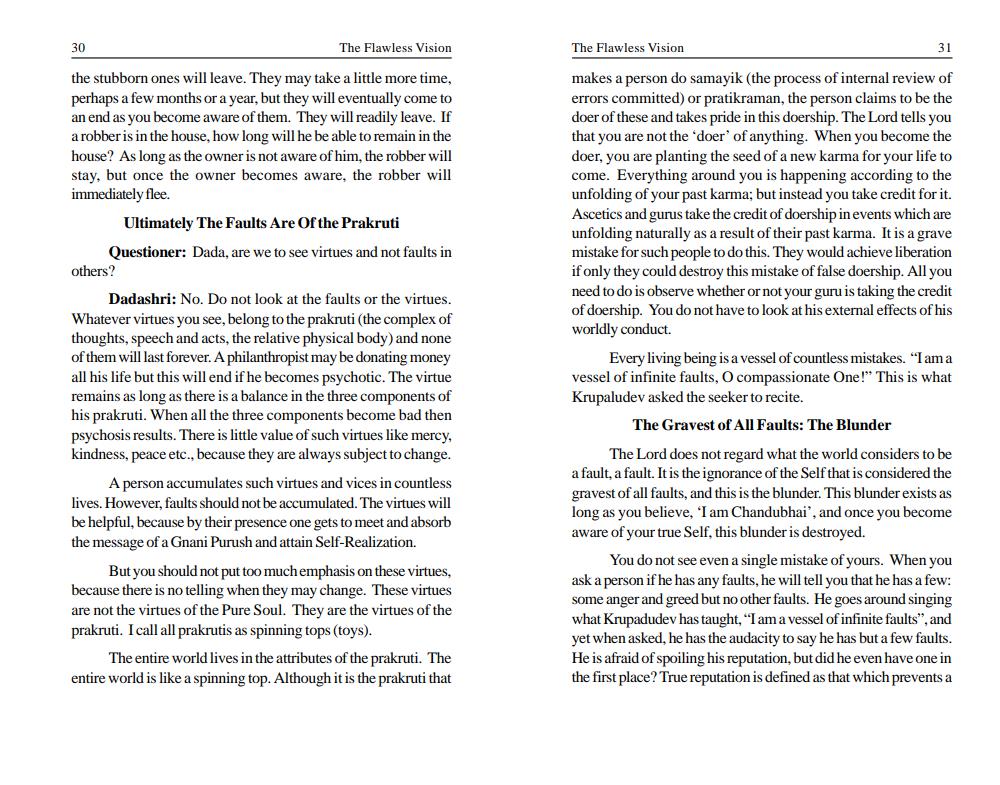________________
30
The Flawless Vision
The Flawless Vision
the stubborn ones will leave. They may take a little more time, perhaps a few months or a year, but they will eventually come to an end as you become aware of them. They will readily leave. If a robber is in the house, how long will he be able to remain in the house? As long as the owner is not aware of him, the robber will stay, but once the owner becomes aware, the robber will immediately flee.
Ultimately The Faults Are Of the Prakruti
Questioner: Dada, are we to see virtues and not faults in others?
makes a person do samayik (the process of internal review of errors committed) or pratikraman, the person claims to be the doer of these and takes pride in this doership. The Lord tells you that you are not the "doer' of anything. When you become the doer, you are planting the seed of a new karma for your life to come. Everything around you is happening according to the unfolding of your past karma; but instead you take credit for it. Ascetics and gurus take the credit of doership in events which are unfolding naturally as a result of their past karma. It is a grave mistake for such people to do this. They would achieve liberation if only they could destroy this mistake of false doership. All you need to do is observe whether or not your guru is taking the credit of doership. You do not have to look at his external effects of his worldly conduct.
Every living being is a vessel of countless mistakes. "I am a vessel of infinite faults, O compassionate One!" This is what Krupaludev asked the seeker to recite.
The Gravest of All Faults: The Blunder
Dadashri: No. Do not look at the faults or the virtues. Whatever virtues you see, belong to the prakruti (the complex of thoughts, speech and acts, the relative physical body) and none of them will last forever. A philanthropist may be donating money all his life but this will end if he becomes psychotic. The virtue remains as long as there is a balance in the three components of his prakruti. When all the three components become bad then psychosis results. There is little value of such virtues like mercy, kindness, peace etc., because they are always subject to change.
A person accumulates such virtues and vices in countless lives. However, faults should not be accumulated. The virtues will be helpful, because by their presence one gets to meet and absorb the message of a Gnani Purush and attain Self-Realization.
But you should not put too much emphasis on these virtues, because there is no telling when they may change. These virtues are not the virtues of the Pure Soul. They are the virtues of the prakruti. I call all prakrutis as spinning tops (toys).
The entire world lives in the attributes of the prakruti. The entire world is like a spinning top. Although it is the prakruti that
The Lord does not regard what the world considers to be a fault, a fault. It is the ignorance of the Self that is considered the gravest of all faults, and this is the blunder. This blunder exists as long as you believe, 'I am Chandubhai', and once you become aware of your true Self, this blunder is destroyed.
You do not see even a single mistake of yours. When you ask a person if he has any faults, he will tell you that he has a few: some anger and greed but no other faults. He goes around singing what Krupadudev has taught, "I am a vessel of infinite faults", and yet when asked, he has the audacity to say he has but a few faults. He is afraid of spoiling his reputation, but did he even have one in the first place? True reputation is defined as that which prevents a




